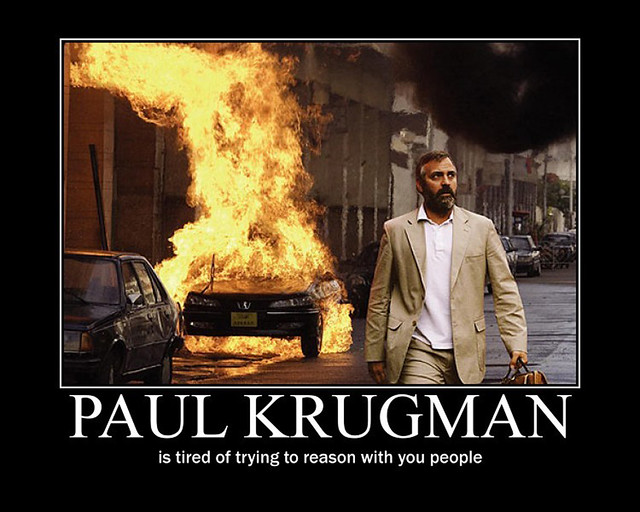Russ Roberts linked to
this old EconTalk with Arnold Kling on his twitter feed today, noting that it was relevant to the responses to Snowden. I hadn't listened to it the first time but since I was just sitting and chugging through data this week it was convenient to have it on in the background.
My non-controversial agreements and disagreements come first and my controversial disagreements come in the next section. However, I think the controversial disagreement should serve to illustrate precisely why the subjectivity of these issues matters so much.
Kling argues that libertarians, liberals, and conservatives think along three very different axes. Libertarians think in terms of coercion and freedom, liberals think in terms of the oppressed and the oppressors, and conservatives think in terms of civilization and barbarism.
I agree with the big picture that people frame their thinking differently and I agree with Kling that a lot of disagreement comes from (1.) the framing itself and speaking different "languages" as he put it, (2.) the fact that man (most?) people don't consider looking at the world through other people's framework, and (3.) as Russ pointed out, people try to fit every issue into their framework (even if it's not a good fit).
So I do agree with all that. I don't agree very much with the axes that Kling chose and I think he's slipping into the same problem he identifies - namely using his own language and framework to try to talk about how liberals and conservatives think. Does the evidence in the talk suggest that Kling could pass the Turing test? I doubt he could. If I had to set out the axis of relevance to each of these groups I would have said they are:
-
Libertarians: big state vs. small state
-
Conservatives: strong vs. weak and status quo vs. change (I couldn't decide here)
-
Liberals: human flourishing vs. lack of flourishing (in the sense of Nussbaum or Sen's "capabilities approach")
I couldn't quite decide on conservatives. If I really had to pick the common denominator it's that they like to approach things from what they perceive as a position of strength and think their adversaries approach things from a position of weakness. This of course is relevant to the defense of the status quo.
The liberal result is obviously more self-serving just like the libertarian axis that Kling provides is more self-serving for him. But it was genuinely tough for me to come up with anything else. Sometimes you hear talk about "equality" or as Kling says "oppression", but that seemed like a very narrow and stereotypical view of what liberals are all about. "Flourishing" or "capabilities" seems better to me because that's truly encompassing of everything that liberals promote. It's the common denominator in the same way that the juxtaposition of a big and a small state is the common denominator for what libertarians think.
The difference is quite obviously not "freedom". Many libertarians don't seem to realize this, but when a liberal hears a libertarian talk about "freedom" it sounds as politically compromised as when George Bush talks about "freedom". Sure, like Bush libertarians get some of what "freedom" means correct, but mostly it's just a word that libertarians use to discuss their position because most people respond well to it (same as why Bush used it). I do not see libertarians I respect like David Henderson or Bob Murphy and think "
they like liberty more than I do" and I fully anticipate they think the same of me. What I think is "
they like a smaller state more than I do".
*****
As I explain below, I'm going to belabor my disagreement here but not exaggerate it - and the belaboring is to make a point.
Generally speaking I enjoyed the talk a lot and agree with most of the substance of it. I'm focusing on what I disagree with because there's more to talk about there almost by definition. Honestly, some of the things I liked about the talk surprised me. For one thing, Kling has always struck me as being especially guilty of the sort of presumptiveness and dismissiveness of other people's frameworks that he's arguing against here. Of the three classic EconLib contributors (David Henderson, Arnold Kling, and Bryan Caplan), Kling always infuriated me the most of the three because he would make these outrageous claims about "how liberals think" that made no sense to me at all and more often than not came across as not only nonsensical, but an attack.
So the discussion was ironic enough to begin with - Kling was talking good sense on a lot of issues I always thought he was guilty of. Then later on "he" came up. I don't even have to say who "he" is because if the subject of discussion is poor treatment of others in the blogosphere and the people holding the discussion are libertarian economists it can only be a single person.
Paul Krugman, of course.
In the talk Kling said that Krugman "
sets a horrible example" and that his "
success has not been a healthy thing for economists" because he sticks to his axis (i.e. - oppressed vs. oppressors) and abandons substance.
There's the Arnold Kling I always remembered!
My jaw dropped. It was like a completely different person from the first half of the discussion. From my perspective - and I've been following both Krugman and the libertarian blogosphere for years now - Krugman's value added is precisely that he stays on substance (an amazing degree of substance given that he's a New York Times blogger... usually Times bloggers don't get too "wonkish"), he challenges people on "his side" (Stiglitz, Obama, Galbraith, etc.) and manages to do both of those things while still passionately makes his case. Most of his attacks are pretty well targeted and directed at politicians but I'm happy to admit he occasionally catches other people in the cross-fire. Still, when he does that it doesn't even approach being as bad as what gets said in the libertarian blogosphere. Taken alone we can obviously criticize Krugman. Taken in the context of the economics blogosphere he's well behaved.
I fully expect thoughtful libertarians to see the situation as being somewhat worse with Krugman than I do. But "
sets a horrible example" is just an unreal thing for Kling to say and if it weren't for how good the first half of his interview was with Russ it would
completely discredit him.
Now I belabored my difference of opinion with Kling here, but I didn't exaggerate my difference of opinion at all. I belabor the point to drive home three ideas:
(1.) I don't think Kling can pass a Turing test, but
(2.) he is completely genuine when he says this about Krugman - as genuine as I am - and he thinks he is making a comment that ought to be taken seriously, and
(3.)
the evaluation of these sorts of framing issues is highly contingent on your framing and your perspective.
I have yet to read Haidt's book but I think this is what bugs me about Haidt too. It's not so much the broad strokes. I agree strongly with both Kling and Haidt that people operating in different ideological spaces frame things differently and think about things differently. It's the details of that claim that seem less sensible. Any kind of content analysis or experiment to derive those sorts of details is going to be plagued by the same contingencies. Certainly Kling drawing on his own personal experience is going to be plagued by the same contingencies.








